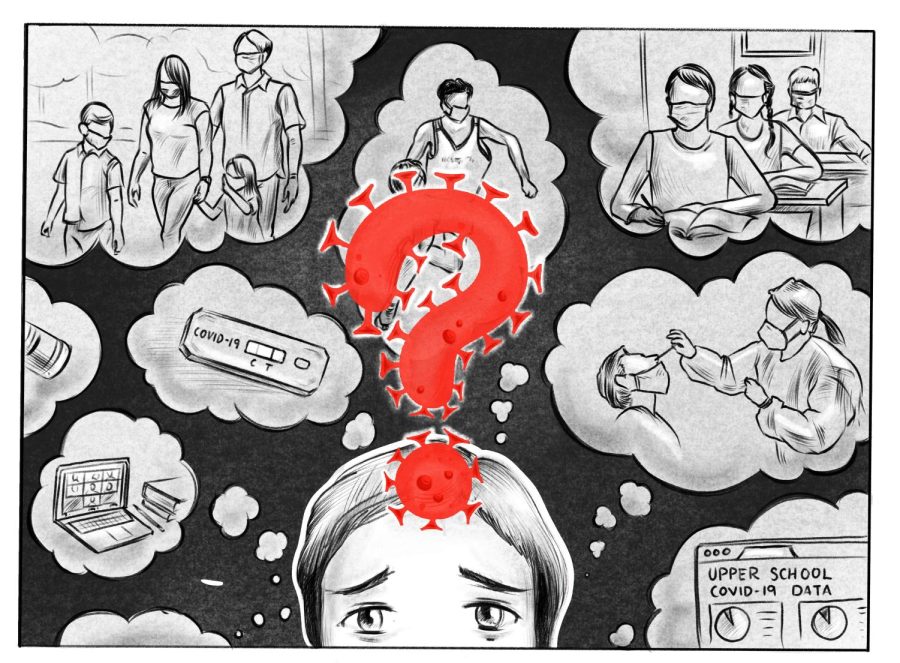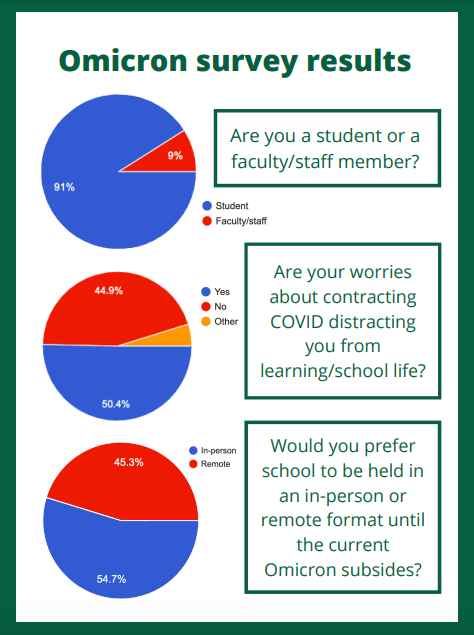Editorial: We need answers
Students require greater clarity about school COVID-19 response
With speculation and rumors spreading faster than the omicron variant itself, tension permeates the campus atmosphere, as empty seats dot classrooms and lunchtime conversations detail the friends who are quarantining in their rooms. In total, 48 students and 16 staff members have tested positive since the start of the school year.
In a survey sent out to members of the Harker Journalism news staff, 96.9% of the 32 responders indicated that they agreed with the stance of this editorial.
With speculation and rumors spreading faster than the omicron variant itself, tension permeates the campus atmosphere, as empty seats dot classrooms and lunchtime conversations detail the friends who are quarantining in their rooms. In total, 48 students and 16 staff members have tested positive since the start of the school year.
At the heart of our concerns are two issues: COVID (both omicron and delta variants) and face-to-face school.
Our community remains split 45% to 55% between whether the best course of action during the current surge is remote or in-person school, indicating the fracture in balancing our physical and mental health.
In a survey sent out on Jan. 11, in which 255 out of 808 students and 25 out of 251 faculty and staff members responded, Harker Aquila found that about a third of those responding reported feeling unsafe or very unsafe on campus in light of COVID-19 and variants.
Compared to the results of the upper school student survey from Dec. 3, in which 97.7% of students indicated feeling safe at school, this difference we’re feeling this month reflects an uncertainty unusual to our on-campus experience, with about 50.0% responding that worries about omicron/COVID are distracting them from learning while they are in class.
The issue is divisive even among Aquila’s news staff: we’ve had long conversations about which options to propose.
Even though staying on campus carries a risk of COVID, our editorial board currently recommends remaining with in-person learning, in accordance with guidance from Santa Clara County health officials to avoid the mental strains in transitioning back to remote learning. Balancing the concern about the severity of omicron’s spread versus our mental health.
But maintaining a healthy in-person environment requires commitment to transparency. In order to remain in-person while increasing student and faculty safety, the editorial board also suggests the following steps to restore confidence in our safety at school:
Improve communication directly to students
The Harker COVID-19 Data Dashboard provides one example of transparency regarding testing statistics and the spread of COVID in our community. Harker’s portal of safety protocols and testing procedures should be communicated in each email from administration. Parents receive weekly updates from the administration, yet this information is not always relayed to students, who are the ones coming into contact at school and should be notified of information pertaining to their own safety.
80.0% of sampled students do not know that the COVID dashboard provides data regarding positive cases at the upper school. The dashboard needs to accurately reflect the number of positive cases across all campuses, and our administration should direct weekly updates about relevant information regarding tests administered and positive cases to students, as well as parents. Frequent emails and Schoology posts directly to students reduce the spread of false information and ensure that students have easy access to pertinent data instead of hypothesizing about infection rates.
Keep our faculty and staff safe
Our faculty and staff have shown tremendous courage during these times, even though they are statistically more likely to face more serious symptoms than younger people. In an email to parents on Jan. 3, Head of School Brian Yager noted that substitute teachers will fill in on behalf of faculty members who contract COVID, and remote learning remains a possibility if classes and programs are short of the staff needed to operate, which has not yet occurred. Students should remain at home if you think you’ve been exposed and are showing symptoms. Our faculty and staff are facing the pandemic’s challenges right alongside us. By doing all we can to protect our staff as we transition to the second semester, we safeguard the adults who shape our daily experience at school.
Make testing and close contact protocols more accessible to students
Although the administration only informs parents when a close contact of a student tests positive, students should also receive this notification, especially with information pertaining to personal health. Protocols regarding what steps individuals should take if they test positive, come into close contact with an infected individual or detect symptoms should be released to all students. Current COVID-testing protocol is unclear: 24.5% responded that they did not know how to receive a COVID test on campus. Sending defined, accessible instructions to students eliminates uncertainty surrounding what actions students should take if they believe they have interacted with the virus in any way.
On an individual level, refrain from treating the omicron variant, more contagious than the SARS-CoV-2 virus, as a “common cold,” a frequent yet inaccurate comparison heard at school. Researchers and the CDC currently lack sufficient data regarding the severity of omicron compared to other variants, and risk of contraction still depends on vaccination status and health conditions.
By committing to clearing up misunderstandings about health protocols, we feel safer as a whole.
For more on Harker’s COVID protocols, visit the FAQ we’ve created. Please direct any concerns you would like addressed to [email protected] or DM @harkeraquila on Instagram.

Nicole Tian (12) is the co-editor-in-chief of Harker Aquila. This is her fourth year on staff, and she previously served as the opinion editor, co-lifestyle...

Michelle Liu (12) is the co-editor-in-chief of The Winged Post. She joined the journalism program in her sophomore year as a reporter and became the Winged...


















![“[Building nerf blasters] became this outlet of creativity for me that hasn't been matched by anything else. The process [of] making a build complete to your desire is such a painstakingly difficult process, but I've had to learn from [the skills needed from] soldering to proper painting. There's so many different options for everything, if you think about it, it exists. The best part is [that] if it doesn't exist, you can build it yourself," Ishaan Parate said.](https://harkeraquila.com/wp-content/uploads/2022/08/DSC_8149-900x604.jpg)




![“When I came into high school, I was ready to be a follower. But DECA was a game changer for me. It helped me overcome my fear of public speaking, and it's played such a major role in who I've become today. To be able to successfully lead a chapter of 150 students, an officer team and be one of the upperclassmen I once really admired is something I'm [really] proud of,” Anvitha Tummala ('21) said.](https://harkeraquila.com/wp-content/uploads/2021/07/Screen-Shot-2021-07-25-at-9.50.05-AM-900x594.png)







![“I think getting up in the morning and having a sense of purpose [is exciting]. I think without a certain amount of drive, life is kind of obsolete and mundane, and I think having that every single day is what makes each day unique and kind of makes life exciting,” Neymika Jain (12) said.](https://harkeraquila.com/wp-content/uploads/2017/06/Screen-Shot-2017-06-03-at-4.54.16-PM.png)








![“My slogan is ‘slow feet, don’t eat, and I’m hungry.’ You need to run fast to get where you are–you aren't going to get those championships if you aren't fast,” Angel Cervantes (12) said. “I want to do well in school on my tests and in track and win championships for my team. I live by that, [and] I can do that anywhere: in the classroom or on the field.”](https://harkeraquila.com/wp-content/uploads/2018/06/DSC5146-900x601.jpg)
![“[Volleyball has] taught me how to fall correctly, and another thing it taught is that you don’t have to be the best at something to be good at it. If you just hit the ball in a smart way, then it still scores points and you’re good at it. You could be a background player and still make a much bigger impact on the team than you would think,” Anya Gert (’20) said.](https://harkeraquila.com/wp-content/uploads/2020/06/AnnaGert_JinTuan_HoHPhotoEdited-600x900.jpeg)

![“I'm not nearly there yet, but [my confidence has] definitely been getting better since I was pretty shy and timid coming into Harker my freshman year. I know that there's a lot of people that are really confident in what they do, and I really admire them. Everyone's so driven and that has really pushed me to kind of try to find my own place in high school and be more confident,” Alyssa Huang (’20) said.](https://harkeraquila.com/wp-content/uploads/2020/06/AlyssaHuang_EmilyChen_HoHPhoto-900x749.jpeg)




